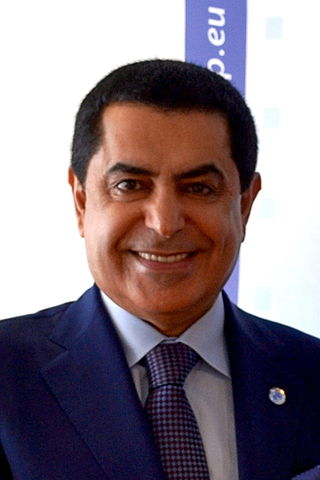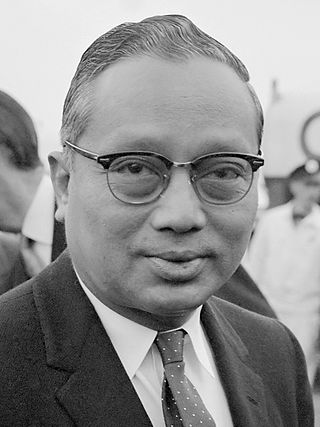
The United Nations (UN) is a diplomatic and political international organization whose stated purposes are to maintain international peace and security, develop friendly relations among nations, achieve international cooperation, and serve as a centre for harmonizing the actions of nations. It is the world's largest international organization. The UN is headquartered in New York City, and the UN has other offices in Geneva, Nairobi, Vienna, and The Hague, where the International Court of Justice is headquartered at the Peace Palace.

The United Nations Security Council (UNSC) is one of the six principal organs of the United Nations (UN) and is charged with ensuring international peace and security, recommending the admission of new UN members to the General Assembly, and approving any changes to the UN Charter. Its powers as outlined in the United Nations Charter include establishing peacekeeping operations, enacting international sanctions, and authorizing military action. The UNSC is the only UN body with authority to issue resolutions that are binding on member states.

The United Nations General Assembly is one of the six principal organs of the United Nations (UN), serving as its main deliberative, policymaking, and representative organ. Currently in its 78th session, its powers, composition, functions, and procedures are set out in Chapter IV of the United Nations Charter.

The United Nations Trusteeship Council is one of the six principal organs of the United Nations, established to help ensure that trust territories were administered in the best interests of their inhabitants and of international peace and security.

The member states of the United Nations comprise 193 sovereign states. The United Nations (UN) is the world's largest intergovernmental organization. All members have equal representation in the UN General Assembly.

The Group of Western European and Other States, also known as the Western European and Other States Group or WEOG, is one of the five United Nations regional groups and is composed of 28 Member States mainly from Western Europe, but also from North America, the Eastern Mediterranean, Fennoscandia and Oceania.

The Group of Eastern European States (EEG) is one of the five United Nations regional groups and is composed of 23 Member States from Eastern, Central and Southern Europe.

United Nations Security Council resolution 1090, adopted without a vote at a closed meeting on 13 December 1996, having considered the question of the recommendation for the appointment of the Secretary-General of the United Nations, the Council recommended to the General Assembly that Mr. Kofi Annan be appointed for a term of office from 1 January 1997, to 31 December 2001.

United Nations Security Council resolution 1482, adopted unanimously on 19 May 2003, after noting correspondence between the President of the Security Council, President of the International Criminal Tribunal for Rwanda (ICTR) and President of the International Criminal Court, the Council extended the terms of office of four permanent judges at the ICTR in order to allow them to dispose of a number of ongoing cases.

The Sixty-sixth Session of the United Nations General Assembly opened on 13 September 2011 at 15:00 and was presided over by former Qatari permanent representative to the UN Nassir Abdulaziz Al-Nasser. The session ended on 18 September as al-Nasser symbolically passed the gavel to the president of the next session, Vuk Jeremic.
United Nations Security Council Resolution 1824 was unanimously adopted on 18 July 2008.

The permanent members of the United Nations Security Council are the five sovereign states to whom the UN Charter of 1945 grants a permanent seat on the UN Security Council: China, France, Russia, the United Kingdom, and the United States.
Malaysia became the 82nd member of the United Nations on 17 September 1957. Malaysia has held a rotational non-permanent seat on the United Nations Security Council for four terms, and has participated in over 30 United Nations peacekeeping missions since October 1960.

The Group of Latin America and Caribbean Countries, or GRULAC, is one of the five United Nations Regional Groups composed of 33 Member States from Central and South America, as well as some islands in the West Indies. Its members compose 17% of all United Nations members.
United Nations Secretary-General selection is the process of selecting the next secretary-general of the United Nations. To be selected as secretary-general, a candidate must receive the votes of at least nine members of the United Nations Security Council, with no vetoes from permanent members. The secretary-general is then appointed by a majority vote of the United Nations General Assembly.
The People's Socialist Republic of Albania joined the United Nations on 14 December 1955, and has participated in several UN peacekeeping operations. The current Representative of Albania in the UN is Mr. Ferit Hoxha. Albania is a non-permanent member of the 15-country UN Security Council for the two-year term (2022–2023).

A United Nations Secretary-General selection was held in 1996 at the end of Boutros Boutros-Ghali's first term. Boutros-Ghali ran unopposed for a second term and received the support of 14 of the 15 members of the United Nations Security Council. However, the United States vetoed his re-selection and eventually forced him to withdraw his candidacy.

A United Nations Secretary-General selection was held in 1961 to replace Dag Hammarskjöld after he was killed in a plane crash. After initial Soviet attempts to replace the secretary-general with a troika, it was agreed that an acting secretary-general would be appointed for the remainder of Hammarskjöld's term. Within two weeks, U Thant of Burma emerged as the only candidate who was acceptable to both the Soviet Union and the United States. However, the superpowers spent another four weeks arguing over the number of assistant secretaries-general, before finally resolving their dispute by allowing Thant to decide for himself. Thant was then voted in unanimously for a term ending on 10 April 1963.
The 1965 United Nations Security Council election was held on 10 December 1965 during the twentieth session of the United Nations General Assembly, held at United Nations Headquarters in New York City. The General Assembly elected seven members as non-permanent members of the UN Security Council, for one- or two-year mandates commencing on 1 January 1966.

A United Nations Secretary-General selection was held in June 2021 to choose the Secretary-General of the United Nations. Incumbent António Guterres was the only official candidate for the position. On June 8, 2021, Guterres was unanimously recommended by the United Nations Security Council (SC) for a second term at the helm of the organisation. His re-election was ratified by the United Nations General Assembly (GA) by acclamation on June 18, 2021, without a vote. Guterres commenced his second term on 1 January 2022.










